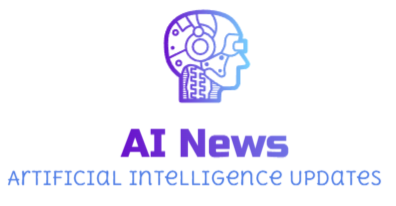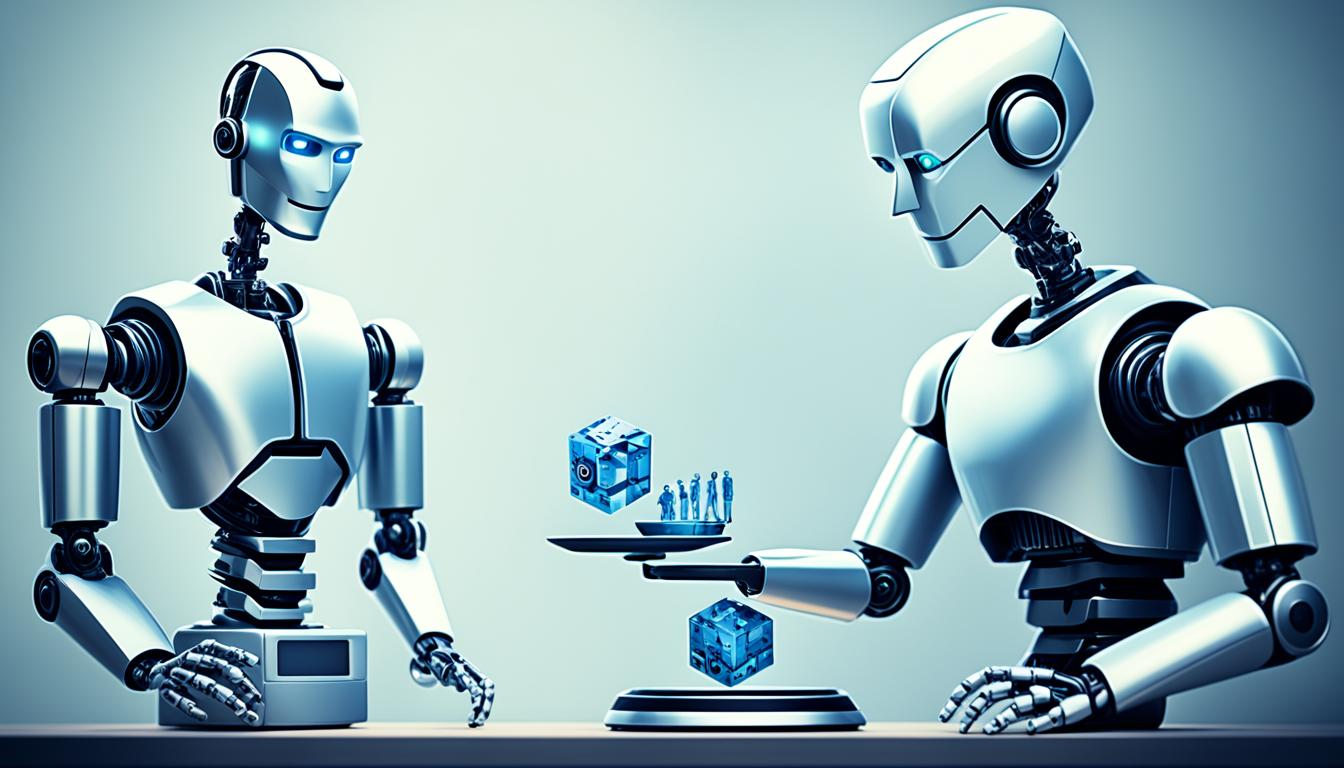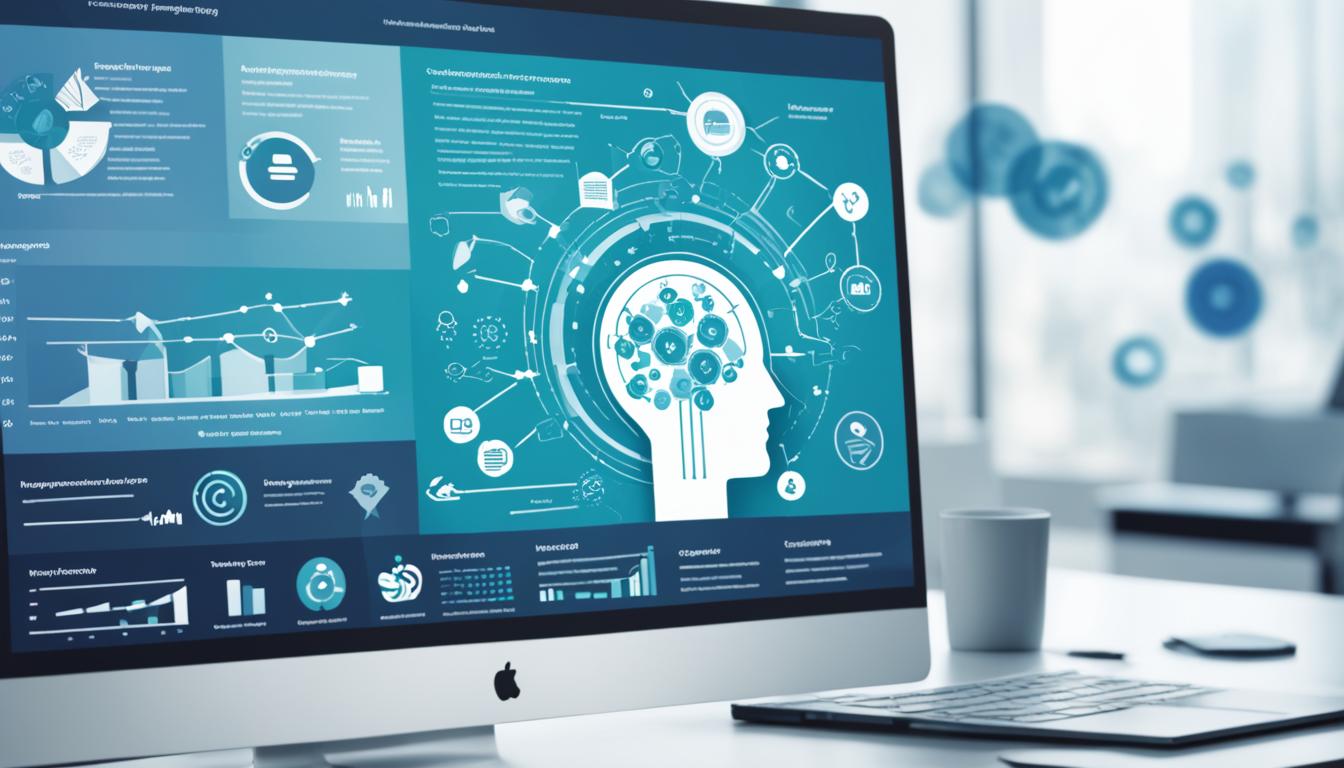Artificial intelligence (AI) is changing our world fast. It brings many benefits like making things more efficient and helping with medical discoveries. But, we must make sure AI is used right, respecting privacy and fairness.
This article looks at how we can balance AI’s benefits with its ethical use. It talks about the big challenges and ways to make sure AI helps everyone. By focusing on ethical AI, we can use this powerful tech safely and protect our values.
Key Takeaways
- Understand the ethical implications of AI, such as privacy, bias, and accountability
- Explore strategies for ensuring data security and privacy in AI systems
- Examine the importance of addressing bias and promoting fairness in AI
- Delve into the significance of transparency and accountability in AI development
- Analyze the impact of AI on employment and job markets
- Consider the ethical considerations in industry applications of AI
- Gain insights into the public perception and societal impact of AI
The Rise of AI and Its Ethical Implications
AI has made huge strides, bringing up big ethical worries. We need to talk about AI privacy concerns and AI surveillance. AI needs lots of data to work well, which makes us wonder about our privacy. For example, facial recognition in public places can watch and record people without asking them first.
We must protect our data and be clear about how it’s used. This keeps people trusting AI and keeps our privacy safe.
AI can also keep and spread AI bias and algorithmic bias from the data it’s trained on. This can lead to unfair treatment, like AI job tools preferring men over women if trained on biased data. We need ways to spot and fix bias in AI systems to make AI fair and equal.
AI that makes choices on its own can be hard to explain or blame when mistakes happen. For example, in car accidents with self-driving cars, figuring out who’s at fault can be tricky. We need clear rules for AI transparency and being accountable to make sure AI is developed responsibly and keeps our trust.
Ensuring Data Security and Privacy
In today’s AI world, keeping data safe and private is key. We need a plan that covers security, privacy, and careful data use. This approach helps keep AI ethical and right.
Setting clear rules for data access and use is vital. By giving access only to those who need it, we protect sensitive data and AI models. Using new privacy technologies helps keep AI data safe.
Having a plan for data breaches is crucial. Good incident response and recovery plans lessen the damage. This keeps operations running and protects important info. By tackling these issues, companies keep trust and innovate with ethical AI.
Addressing Bias and Ensuring Fairness in AI
As AI becomes more common, the problem of bias in these systems is getting more attention. AI can be biased from the data it’s trained on, the algorithms used, and the choices made by developers. This bias can cause unfair and discriminatory results, especially for gender or race.
Sources of Bias in AI
One main cause of AI bias is the data used for training. If this data doesn’t represent everyone, the AI might make decisions that help some groups more than others. This is known as *algorithmic bias*, making existing biases worse.
Another reason for AI bias is *demographic bias*, where the system works better for some groups than others. This happens when the team making the AI lacks diversity or doesn’t think about the needs of all groups.
Strategies for Mitigating Bias
To fix these problems and make AI fair, we need strategies to reduce bias and *debias* AI systems. This means using diverse data, checking AI for bias often, and getting feedback from many people. Having clear rules and being accountable also helps make AI fairer and more *inclusive*.
Transparency and Accountability in AI Development
As AI gets more advanced, making sure it’s transparent and accountable is key. *AI transparency* and *AI accountability* help keep the public’s trust. They make sure these powerful technologies are used right.
Highly *autonomous AI* can make decisions that are hard to understand or trace back to humans. We need clear rules for who is responsible if something goes wrong with these systems. This helps reduce risks and supports *explainable AI*.
By focusing on *responsible AI development*, companies and researchers can make AI more transparent. This lets the public and leaders see how AI works and decides. This leads to more trust and acceptance of these technologies. It helps them be used in a good and ethical way.
AI and Ethics
AI is becoming more common in many areas, making us think about its ethical sides. AI ethics is about rules and ideas that help use AI right. It makes sure AI helps society and doesn’t hurt people.
Core Principles of AI Ethics
The main ideas of AI ethics are fairness, being clear, taking responsibility, keeping data safe, doing good, respecting choices, and fairness. These ideas help make AI systems better and more responsible. They make sure AI development is done right and with care.
AI should treat everyone fairly and not show bias. It should be clear about how it makes decisions. This lets people check on it and hold someone responsible.
Keeping personal info safe is important. AI should aim to do good and not harm. It should respect people’s choices and make sure everyone gets a fair share of AI’s good and bad sides.
Following these principles of AI ethics helps groups and leaders deal with the tricky parts of AI development. It makes sure AI technologies match what society values and needs.
The Impact of AI on Employment and Job Markets
AI has changed the job market fast. It’s taking over many tasks, making people worry about losing their jobs. AI job displacement and its effects on AI and employment are big concerns.
Now, automation and jobs are closely linked. AI technologies like robotic process automation (RPA) and machine learning are changing jobs. For example, AI robots in factories have made some assembly line jobs obsolete, leaving workers unsure about their future.
To deal with ethical considerations in AI-driven job markets, we need a complex plan. We must invest in training programs for workers. These programs will help them get the skills needed for new jobs. This way, we can lessen the harm from AI on jobs and create lasting work opportunities.
Ethical Considerations in Industry Applications
AI is growing fast in many fields, making us think more about its ethics. In healthcare, AI could change how doctors make decisions and help research move forward. This shows how AI for social good can make a big difference. But, we must test and watch these ethical AI in healthcare systems closely to avoid hurting patients.
We need AI systems that put patients first and help doctors make smart choices. This is key to making the most of AI in medical decision-making.
In finance, AI helps with things like loan approvals and investment choices. It’s important to make AI-driven financial decisions clear and build trust in AI-powered financial services. This ensures ethical AI in finance practices. By making AI explain its choices clearly, we can keep the public trusting AI in finance.
Public Perception and Societal Impact of AI
How people see artificial intelligence (AI) and its effects on society is very important. As AI gets more common, worries about it taking human jobs or the dangers of self-driving weapons can make people lose trust. This can slow down the responsible use and growth of AI.
To have a better and helpful talk about AI’s ethics, we need to tackle these worries. We should show how AI can make our lives better. By teaching the public and showing AI’s benefits, we can gain trust and close the gap between public perception of AI and the societal impact of AI.
As AI’s influence on society grows, making sure people trust AI is key. We must be open, answer for our actions, and help people understand AI well. This way, the public can make smart choices and help shape AI’s ethical path. Working together is crucial to make sure AI’s power helps humanity.
Conclusion
With AI advancing fast, making sure it’s developed ethically is more important than ever. Ethical AI and responsible AI development are key topics now. We need a complex plan to tackle the ethical issues they bring up.
Creating strong AI governance rules and clear AI ethics guidelines is crucial. This helps balance AI’s big potential with our values like privacy and fairness. By working together, developers, policymakers, and the public can make sure AI’s good points are used more and its bad points less.
The way forward is about finding a balance between innovation and responsibility. As we use AI more, we must stick to ethical rules. This ensures AI helps us without hurting people or society.





